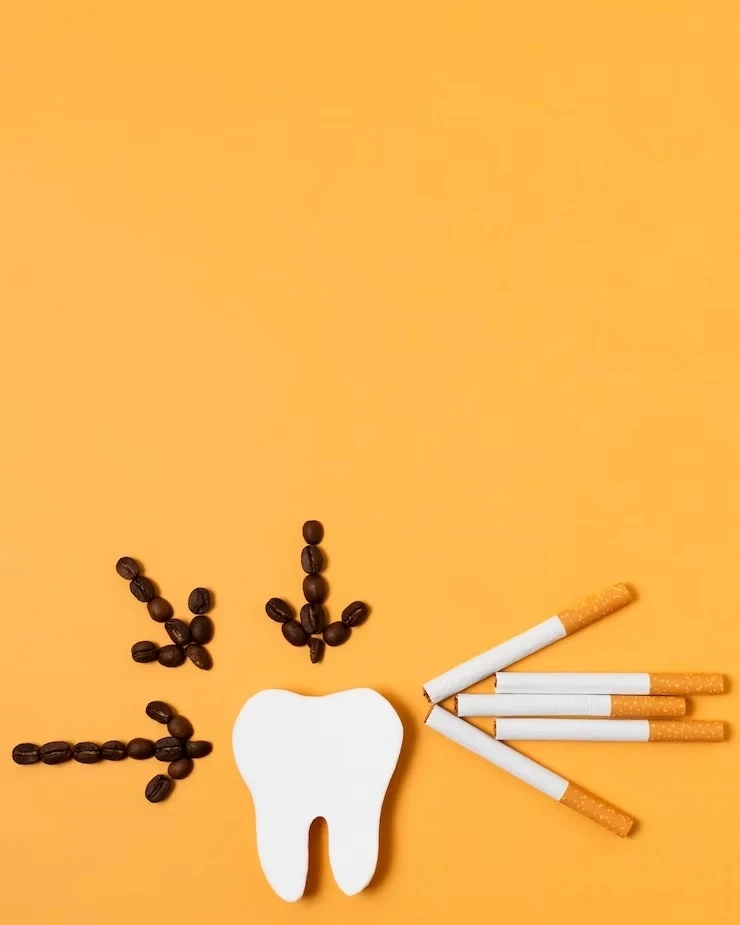Today, it is well known that smoking cigarettes has a detrimental effect on your physical health and overall well-being. Cigarette smoking is one of the primary causes of preventable deaths in America, with an alarming mortality rate surpassing all other avoidable factors. In addition, it has been connected to various medical conditions, including oral health issues like tooth decay, gum disease, and cancer.
Unfortunately, many individuals have yet to learn about the devastating repercussions that smoking can have on their teeth. Smoking affects the look of your smile and can lead to serious dental issues such as gum disease and tooth decay.
It’s never too late to stop smoking, which can save your teeth from further damage. In this article, we'll discuss how smoking affects and causes damage to your teeth and gums.
What Does Smoking Do to Your Teeth?
1. Tooth Discoloration
The most immediate effect smoking has on your teeth is discoloration. Smoking stains the enamel and causes it to be yellow or brown. These stains are difficult, if not impossible, to remove with regular brushing and flossing.
Therefore, a professional dental cleaning may be required to restore the natural color of your teeth. In addition, cigarette smoke consists of nicotine and tar penetrating deep within the cracks, making it virtually impossible to brush away.
2. Tooth Decay
Smoking increases the risk of tooth decay and cavities. This is because it reduces saliva flow, which is essential for neutralizing acid, washing away food particles, and remineralizing hard enamel that protects your teeth from decaying.
Furthermore, it affects the immune system, decreasing its effectiveness in fighting off plaque-causing bacteria. The combination of all these factors causes tooth decay and cavities, resulting in the need for fillings and other treatments.
3. Gum Diseases
Smoking also increases your risk of periodontal disease, commonly known as gum disease. Tobacco use can wreak havoc on your immune system, making it tougher for your body to combat the bacteria that thrive near the gumline. When left untreated, periodontal disease can cause a person to lose their teeth as the bacteria triggers inflammation and bleeding of the gums. The resulting gum recession is incredibly painful and should be addressed immediately to avoid potential tooth loss.
4. Periodontal Disease
Smoking also reduces the amount of oxygen in your mouth, making it difficult for gum tissue to heal. Thus, smokers are more prone to periodontal disease - an infection of the gums caused by bacteria.
This condition can cause tooth loss and other serious complications if left untreated. Early stages of periodontal disease can usually be reversed with regular visits to the dentist. However, if one continues to smoke or use tobacco products long-term, the issue could become more severe.
5. Bone Damage
Smoking can also cause bone damage in the jaw, leading to tooth loss. Tobacco products contain toxic chemicals that weaken the jawbone and inhibit its healing ability. This weakens its overall structure and makes it more susceptible to periodontal disease.
In extreme cases, periodontal disease can be so advanced that surgery is needed to restore the damaged bone structures. To address such cases, surgeons may perform restorative surgery or even a bone grafting procedure.
Related posts: NEW YEAR, NEW RESOLUTION: QUIT ALCOHOL AND SMOKING & How Smoking Affects Your Heart And Ways To Protect It
6. Tooth Loss
When you smoke, your gums become inflamed and begin to recede from the teeth, which can lead to eventual tooth loss. That is why smokers must quit protecting their oral health.
Not only does smoking increase the risk of gum disease, but also it has been linked with other serious conditions such as cancer and stroke. So quitting today is one big step towards a healthier future. In addition, smoking can also cause bone damage, making it difficult for the jawbone to heal and sustain teeth.
7. Delayed Healing Process
Smoking is detrimental to your overall health and hinders the healing of dental treatments such as fillings and implants. Smoking reduces blood flow and prevents oxygen from reaching the gums, making it difficult for them to repair themselves. The habit of smoking can have a detrimental effect on your oral health as it increases the likelihood that any gum-related issues won't be able to heal properly.
Wrapping Up
Smoking has a serious and detrimental effect on oral health, increasing the risk of tooth decay, gum diseases, periodontal disease, bone damage, and eventual tooth loss. The habit also delays the healing process after any dental treatments are performed.
To improve your oral health and ensure that any treatment is successful, you must practice good oral hygiene and quit smoking if you are a smoker. Electric toothbrushes are extremely helpful for this purpose, as are regular visits to your dentist or online pharmacist. With proper care taken today, you can enjoy strong teeth and gums far into the future.


